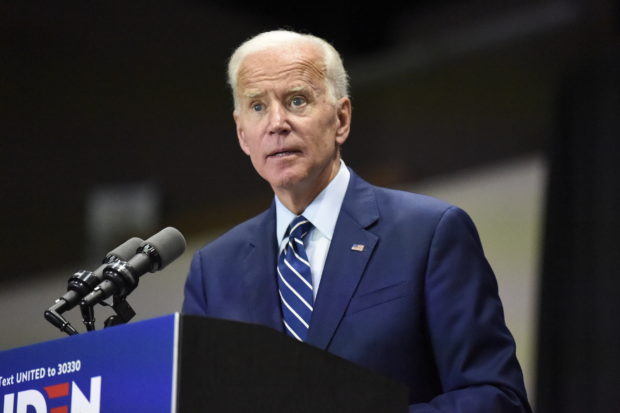SUMTER, S.C. – Former Vice President Joe Biden on Saturday apologized for recent comments about working with segregationist senators in his early days in the U.S. Senate, saying he understands now his remarks could have been offensive to some.

Democratic presidential candidate and former vice president Joe Biden speaks at a campaign event in Sumter, S.C, on Saturday, July 6, 2019. (AP Photo/Meg Kinnard)
“Was I wrong a few weeks ago?” Biden asked a mostly black audience of several hundred during the first day of a weekend visit to South Carolina. “Yes, I was. I regret it, and I’m sorry for any of the pain of misconception that caused anybody.”
Biden’s comments came as he and rival presidential candidate Kamala Harris were set to circle each other while campaigning Sunday in South Carolina, the first Southern state to vote in next year’s primary and a crucial proving ground for candidates seeking support of black Democrats.
Biden defended his record on racial issues and reminded voters of his ties to former President Barack Obama, whose popularity in South Carolina remains high.
The former vice president and the California senator probably will be pressed on their tense debate exchange over race and federally mandated school busing.
Though the issue is not at the forefront of the 2020 primary, it could resonate in a state with a complicated history with race and segregation.
Without naming Harris, Biden on Saturday referenced what he characterized as expected attacks from other campaigns eager to take him on.
“I’m going to let my record stand for itself and not be distorted or scared,” Biden said. He recalled his support of Obama’s criminal justice reforms and pointed out areas in which he disagreed, such as the three-strikes policy that led to longer sentences for repeat offenders.
“I’m flawed and imperfect like everyone else. I’ve made the best decisions that I could at the moment they had to be made,” Biden said. “If the choice is between doing nothing and acting, I’ve chosen to act.”
Several Harris supporters in the state said her pointed and personal critique of Biden, who opposed busing mandates in the 1970s, struck a chord in South Carolina.
Marguerite Willis, a recent Democratic candidate for governor, said that when Harris spoke in last month’s debate about her own experiences being bused as a child, the entire room where Willis was watching the debate grew quiet.
“Growing up here in South Carolina, that’s meaningful to us,” said Willis, who is white. Schools were segregated when she was a child, and she recalled not meeting a black girl her age until leaving the state for college.
“So when she talked about being bused, it was powerful for me and I’m sure it’s powerful for a lot of people here who have experiences of their own.”
On the subject of busing, Biden told voters: “I don’t believe a child should have to get on a bus to attend a good school. There should be first-rate schools of quality in every neighborhood of this nation, especially in 2019 America.”
Biden began a scheduled three-stop swing in South Carolina on Saturday, his third campaign visit to the state, with stops in Sumter, Orangeburg and Charleston.
Harris, who planned appearances Sunday in Florence, Hartsville and Myrtle Beach during her ninth trip to the state, has spent more time in South Carolina than any other state in the early primary landscape.
The campaign dynamics have shifted and become more personal since the last time Biden and Harris were in South Carolina.
In the debate, Harris was unrelenting in her criticism of Biden, both his views on busing and his comments about working with segregationist senators.
Biden told CNN in an interview that aired Friday that he “wasn’t prepared for the person coming at me the way she came at me,” noting that Harris knows him and his son, Beau, who died of brain cancer in 2015. /gsg